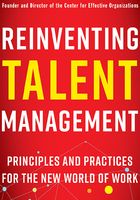
TALENT MANAGEMENT SHOULD BE BASED ON SKILLS AND COMPETENCIES
Traditional organizations are built with a job-oriented, hierarchical mind-set. As a result, how employees are treated and managed depends more on the job they are doing than on their performance, skills, competencies, and needs. In the traditional hierarchical bureaucratic organizations of the past this may have been defensible, but it is not in today’s world of work and will be even less so in the future. The management of talent needs to be designed to focus on the needs, skills, and competencies of individuals. This is the single most important thing that the talent management system of an organization can do to ensure that the organization will perform effectively and be prepared to deal with a dynamic environment. It means focusing on what skills individuals have and on what skills might be needed for an organization to be effective and evolve in an agile, strategically appropriate way.
In a job-based organization, how talent is treated is primarily determined by the hierarchical position it has. This includes how and how much employees are paid, how they are selected, the training they receive, their mobility, where they park their cars, where they work, what kind of furniture they have, and so on. In a skill-sand competency-based talent management system, the key drivers—pay, recruiting and selection, training and development, where someone is located, and how someone is treated—shift. Such a system is focused on what skills an individual has vis-à-vis what skills the organization needs to be effective. Particular attention needs to be paid to determining and developing the skills that make a difference in organizational performance.
An organization will develop the performance capabilities that are aligned with its strategy, and the ability to change its capabilities when the strategy calls for it, only if a skill- sand competencies-based focus exists. Thus, it is critical that the organization’s talent management system and practices be based on skills and competencies.